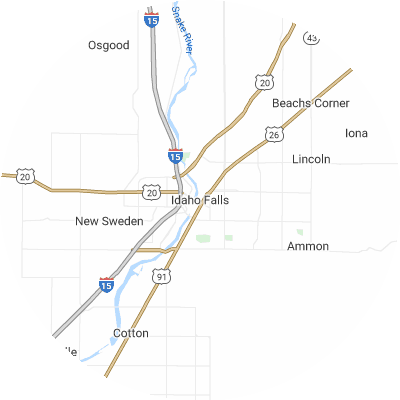Please enter a valid 5-digit zip code!
Written By David Cusick
Last Updated April 2024
A new solar energy system will provide you with a renewable power source that will eventually pay for itself. Going solar can help cut your utility bills and reduce your environmental impact. But you'll want to find a qualified installation company first. Luckily, we've reviewed the options and created a guide to the best and most trustworthy solar installation providers in Idaho Falls.
Free quotes
Prompt service delivery
Clear pricing policy
Reliable customer support
Services Offered
Clear pricing policy
Reliable customer support
Free quotes
Informative resources
Services Offered
Reliable customer support
Free quotes
Informative resources
Clear pricing policy
Services Offered
Clear pricing policy
Informative resources
Reliable customer support
Free quotes
Services Offered
Today's Homeowner looks at dozens of datapoints on solar companies to come up with our data-driven rankings. It's not possible for a company to pay for preferential treatment in our rankings. We look at the following key factors in determining who should top our list:
Adopting solar power lets homeowners lower utility bills while benefiting the planet by reducing your carbon footprint using clean energy. If you’re evaluating if you want to go solar, consider these key factors for choosing an installer.
Hiring a licensed solar installer is critical. This ensures that the work is done correctly using the most up-to-date installation methods. Idaho's Division of Building Safety recently began issuing solar photovoltaic contracting licenses. If you're installing a solar thermal system, your installer must be a licensed plumbing contractor.
Check the Better Business Bureau (BBB), TrustPilot, Google Reviews, and other review sites to see what past customers have to say about local solar installers. Detailed reviews on these platforms can help you evaluate a provider's integrity and customer service. Stay away from companies with few or mainly poor reviews.
Get free, detailed quotes from at least three solar companies. A quote should outline all costs and identify the solar parts included. Comparing several quotes can help you find the best value for your budget.
Quality solar installations should have comprehensive workmanship and performance warranties. The workmanship guarantee covers any installation problems such as poor alignment, cracks in the panels, or poor wiring. The performance guarantee promises a specific energy output level. Strong warranties indicate that a solar installer has faith in its installations.
Solar energy can help decrease your electric bills over time. When weighing the total price and value of solar panels, make sure to consider these factors.
In Idaho Falls, solar panels cost an average of $3,460 per kilowatt, with an average system size of 7.4 kilowatts. The typical Idaho Falls homeowner spends $17,946 on their solar array after federal tax refunds. An estimate from a local provider will factor in additional information reflecting your desired system's size, required preliminary work, capacity, and panel type. In some cases, homeowners may prefer leasing solar panels to reduce upfront costs.
Incentive Amount:
Air Source Heat Pump Conversion: Contact IFP
Air Source Heat Pump Conversion with Duct Sealing: contact IFP
Ground Source Heat Pump: $2,700-$3,150
Ductless Heat Pump: $720
Water Heater: $270-$450
Insulation (Attic, Floor, Wall): Varies, see program website for details
Windows: Varies, see program website for details
Incentive Type: Personal Tax Deduction
Incentive Amount:
40% in the first year; 20% per year for next three years
Incentive Amount:
Ductless Heat Pumps: Up to $1,700
Electronically Commutated Motors: Up to $100
Evaporative Coolers: Up to $200
Heat Pumps: up to $750
Ground Source Heat Pumps: up to $2,500
Rooftop Heat Tape Timer: up to $100
Room Air Conditioners: Up to $20
Smart Thermostats: $50
Whole House Ventilation Fans: up to $125
Manufactured Homes Duct Sealing: Free service available
Manufactured Homes Ductless Heat Pumps: Up to $1,300
Lighting: Special pricing at certain retailers
Heat Pump Water Heaters: up to $550
Insulation: Up to $0.10/sq.ft
A solar photovoltaic (PV) array can generate power to run any electric appliance or system in your home. More specifically, you can install a solar heating system for your water.
With home solar energy, you can save money on your energy bill, lower your property's emissions, and be better prepared if there's an outage to the local grid.
It depends on your location and what type of panels you're installing. Since there's a moderate amount of snowfall in Idaho Falls, your best time to get solar is in the spring and fall.
Generally speaking, your energy bills will significantly decrease after you install solar panels. This is because you're using the energy you generate for free rather than buying it from your power company. In Idaho Falls, the average amount someone can save is $1,157 per year. With net metering programs offered by many utilities, you could ultimately make a profit from your system when your payback period is done.
The maintenance you'll need to do will vary based on the type of solar panels you have. With any system, you should clean and inspect each panel four times a year. Your solar energy company might offer comprehensive plans where they'll do the maintenance for you.
Net metering is a power purchasing policy that allows solar energy system owners to receive compensation for the amount of energy they put back into the grid. It's available in most states and is a great way to reduce energy costs.
